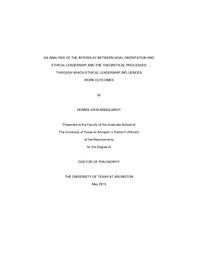
ATTENTION: The works hosted here are being migrated to a new repository that will consolidate resources, improve discoverability, and better show UTA's research impact on the global community. We will update authors as the migration progresses. Please see MavMatrix for more information.
Show simple item record
| dc.contributor.author | Marquardt, Dennis John | |
| dc.date.accessioned | 2017-05-31T19:27:40Z | |
| dc.date.available | 2017-05-31T19:27:40Z | |
| dc.date.submitted | January 2015 | |
| dc.identifier.other | DISS-13015 | |
| dc.identifier.uri | http://hdl.handle.net/10106/26710 | |
| dc.description.abstract | Due to recent heightened public awareness of ethics and ethical scandals inbusiness, the ethical leadership construct has become increasingly popular. However, scholars still know little about the predictors of ethical leadership and the specific processes through which ethical leaders influence their followers. Across three different papers, I contribute to the literature by addressing these gaps. The first paper consists of a theoretical review of goal orientation and ethical leadership with specific focus on the interplay between the two constructs. In the second paper I use latent path analysis with a sample of 234 supervisor/subordinate dyads and find leader trait-avoid goal orientation as a significant negative antecedent to ethical leadership. Additionally, I find evidence supporting the social learning influence of leader trait goal orientation on follower state goal orientation. Specifically, leader trait-prove and trait-avoid goal orientation directly influenced follower state-prove and state-avoid goal orientation respectively. Ethical leadership mediated the relationship between leader trait-learn and trait-avoid and follower state-learn and state-avoid respectively and indirectly influenced task-related organizational citizenship behaviors (OCBs) through follower state-avoid. Finally, the third paper consists of a meta-analysis of empirical ethical leadership studies through 2014 (k=81, N=19,101). I find support for a primary social exchange explanation for ethical leadership's influence on follower OCBs and a social learning explanation for its influence on follower unethical behavior. Contrary to predictions, report intentions (i.e., willingness to report unethical behavior) was best explained through a social exchange perspective. Mixed theoretical influence was found for task performance and affective commitment. | |
| dc.description.sponsorship | Bell, Myrtle | |
| dc.language.iso | en | |
| dc.publisher | Business Administration | |
| dc.title | An Analysis Of The Interplay Between Goal Orientation And Ethical Leadership And The Theoretical Processes Through Which Ethical Leadership Influences Work Outcomes | |
| dc.type | Ph.D. | |
| dc.contributor.committeeChair | Bell, Myrtle P. | |
| dc.degree.department | Business Administration | |
| dc.degree.discipline | Business Administration | |
| dc.degree.grantor | University of Texas at Arlington | |
| dc.degree.level | doctoral | |
| dc.degree.name | Ph.D. | |
Files in this item
- Name:
- Marquardt_uta_2502D_13015.pdf
- Size:
- 1012.Kb
- Format:
- PDF
This item appears in the following Collection(s)
Show simple item record


